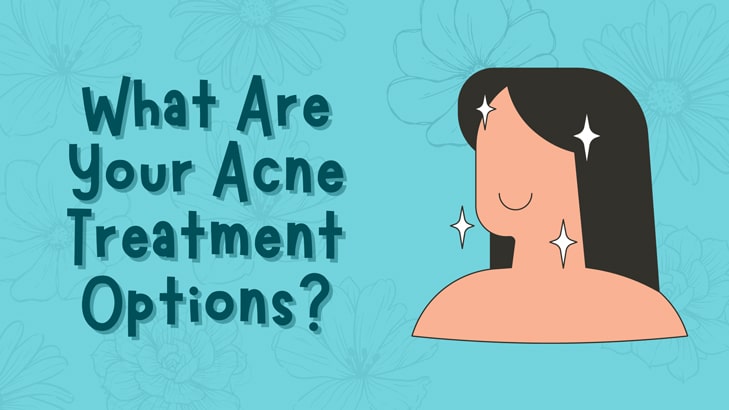Waking up to see a pimple on your forehead, chin, or nose is distressing to just about anyone. Unfortunately, acne is an unwelcome dilemma that can affect anyone at any time in their life. A pimple here or there typically isn’t a cause for major concern. However, recurring, painful, or persistent acne can be a sign that something more significant is going on.
Fortunately, there are a number of ways to combat acne. With the right protocols in place, you can start feeling better in your own skin. Below, a comprehensive overview of all your acne treatment options — none of which include picking or prodding!
1. Prescription Topical Medications
Whether you have mild, moderate, or hormonal acne, prescription topicals can work for you. Applied daily, topicals work by eliminating current pimples and preventing future ones from appearing. There are different forms of topical medications, which you can use alone or in combination with other treatments. If time is of the essence, you can set up an online evaluation with a medical provider who can prescribe acne treatment online if deemed appropriate. This can be an easy way to get treatment quickly and have a personalized plan that’s right for your unique skin needs.
Antibiotic creams and tretinoin are a couple options a provider might recommend. Antibiotics target the actual bacteria that lead to acne. And tretinoin increases cell turnover, which can help reduce acne from starting in the first place. If you struggle with hormonal acne, a topical might not work for you. In this case, your medical provider may recommend birth control or spironolactone. (More on these below.)
2. Prescription Oral Medications
While topicals are oftentimes the first line of defense, your provider may also suggest an oral prescription. If you have body acne, oral medications may work better since you may not be able to physically apply the topical in hard-to-reach places like your back. Oral medications like antibiotics work by targeting the bacteria that causes acne to start in the first place. These are typically prescribed for a short or limited time, reducing their negative side effects like nausea and diarrhea.
Another oral medication for acne is a combination birth control pill. Hormone imbalance or fluctuations are a major trigger for acne. A birth control pill can help regulate your hormones, leading to less breakouts. If you’re considering this option, be sure to ask about any short or long-term side effects to being on a birth control pill. Spironolactone, an anti-androgen, might be a better option for you. This prescription can help balance hormones, like testosterone, to reduce oil production and keep pores clear.
3. Over-the-Counter Products
Treating your acne can be as simple as going to the drug store. Many products that can help your acne woes are available over-the-counter. This includes everything from face washes and cleansers to serums and creams. Active ingredients like benzoyl peroxide, salicylic acid, retinol, and azelaic acid are all known to tame acne. However, be mindful of combining products, as some ingredients may counteract each other, further irritating your skin.
When it comes to over-the-counter products, always check the ingredient list to ensure you’re getting the most bang for your buck. Some brands may promote their products as good for acne-prone skin but still include pore-clogging ingredients. Just because something is labeled as “organic” or “natural” doesn’t necessarily mean it’s going to help your acne. Shea butter, coconut oil, and palm oil may seem like safe ingredients, but they can actually perpetuate your acne. Choosing products marked as “non-comedogenic,” guarantees a product shouldn’t clog your pores.
4. Procedures
If your acne has resulted in scarring, then you may want to consider trying professional skincare treatments. No matter if your topical or prescription is working on your current acne, it may not necessarily erase stubborn scarring. Lasers and light treatments are two procedure options used on those with both current acne and those suffering from scarring. Similar to topicals and oral treatments, these treatments won’t provide instant results. Still, recent developments and new technology have made this option more accessible than ever before.
There are different types of lasers and light treatments, but in general these work by using thermal energy. The treatment triggers new collagen production, reducing inflammation and redness. It should be noted that these treatments aren’t necessarily cheap, and you’ll likely need to have a few treatments to see results. However, if you’re fed up with your spots and looking for something powerful, these procedures may be worth the cost and effort. Do your research ahead of time to find a board-certified dermatologist that has experience. They can recommend the right professional treatment for your breakouts.
Takeaways
Acne can be caused by a variety of factors, which makes it one of the most common skin conditions in the world. While you may be tempted to pop your acne away, resist the temptation. You’re likely only going to make the situation worse and run the risk for hyperpigmentation and scarring. Instead, choose a treatment option that works for your skin and your lifestyle. Talk to professionals about your treatment options. When you find what’s right for you, stay consistent. And remember, your beauty is more than skin deep.
